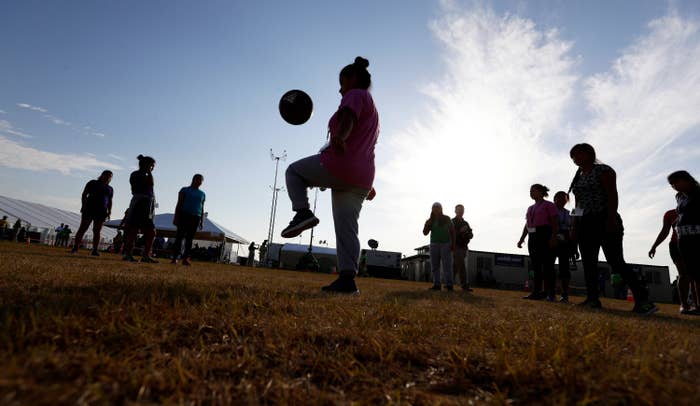
A government watchdog report published Wednesday said immigrant children who were separated from their parents at the border by the Trump administration last year suffered increased post-traumatic stress and trauma.
Some unaccompanied immigrant children who end up at government facilities already experienced physical or sexual abuse in the countries they fled, or violence on the journey to the US, the report said. The trauma was only made worse by the “zero tolerance” policy that led to thousands of children being systematically separated from their parents by immigration authorities in the spring of 2018.
Separated children experienced heightened levels of anxiety, fear, and PTSD compared with children who were not taken from their parents, the Department of Health and Human Services (HHS) Office of Inspector General said. Its report looked at facilities funded by HHS’s Office of Refugee Resettlement, which had custody over children who were separated from their parents or who arrived in the US unaccompanied by an adult.
“Some separated children expressed acute grief that caused them to cry inconsolably,” the report said. “Children who believed their parents had abandoned them were angry and confused. Other children expressed feelings of fear or guilt and became concerned for their parents’ welfare.”
The report offered additional details on the effects the Trump administration’s systematic family separations had on immigrant children and how the trauma was made worse by federal agencies’ lack of preparedness and poor record-keeping.
One 7- or 8-year-old boy who was separated from his father believed his dad had been killed and that he would also be killed. The child ended up in emergency psychiatric care.
One medical director said separated children felt physical manifestations of their psychological pain and made statements like “every heartbeat hurts” or “I can’t feel my heart.”
The increased mental health issues were made worse by the difficulty in finding the parents of separated children and being able to set up phone calls with the kids — due to the government’s lack of record-keeping for separated children.
During the height of family separations at the border, statements from federal authorities revealed the Trump administration had little to no planning for how the children and parents would eventually be reunited.
At a court hearing in 2018 before a judge who ordered the Trump administration to reunite separated children, Justice Department attorneys acknowledged that the government is uncertain it knows the whereabouts of all the parents of 101 children under the age of 5. Around the same time, Health and Human Services Secretary Alex Azar told reporters that the agency was scrambling to be sure it knew the location of all the children who’d been separated from their parents.
Program directors at facilities holding separated children said the process for reuniting children covered by the judge’s order changed frequently and with little notice, adding to the stress and mental health needs of these kids.
Some reunifications were scheduled with little notice, were suddenly canceled, or were delayed. In one case, a girl was moved from a facility in Florida to a facility in Texas to be reunited with her father, but after making several trips to the detention center, she was sent back to Florida “in shambles” without ever seeing her dad.

Another HHS OIG report, the result of 45 visits to facilities and a review of some employee files last year, found that some facilities holding unaccompanied immigrant children didn’t have proof of employees’ FBI fingerprint or Child Protective Services background checks.
Half of the facilities allowed employees to start working with children before getting the results of either the FBI fingerprint check or the CPS check, or both, the report said. Ten employees worked with children for a year or more with no prior FBI criminal background check.
Amy Frontz, assistant inspector general for audit services, said that for the employees that they were able to eventually get background information, no disqualifying factors were found. And an OIG spokesperson said, “We don’t have information at this time that the lack of background checks resulted in any specific abuse or assault cases.”
“However, some employees when we completed our work did not have have an FBI background check or CPS check,” Frontz said.
Frontz noted that in 2018, HHS OIG released a memo that staff at the “tent city” in Tornillo, Texas, that was holding hundreds of immigration children, were not undergoing FBI fingerprint checks. After more than 1,500 employees had their background checks conducted following the memo, 26 people were terminated because of their results, Frontz said.
UPDATE
An OIG statement was updated to reflect they don't have information at this time that the lack of background checks resulted in any specific abuse or assault cases.
